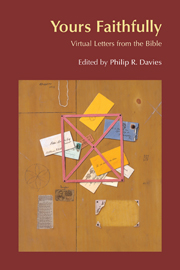Book contents
- Frontmatter
- Contents
- INTRODUCTION: IN PRAISE OF VIRTUAL LETTERS
- 1 Sarah to Abraham
- 2 Isaac to Abraham
- 3 Sarah to Rebekah
- 4 Pharaoh Ramses to Moses
- 5 Aaron to Miriam
- 6 Jephthah's Daughter to her Father
- 7 Samson to Delilah
- 8 Shmuel ben Elkanah to Achish
- 9 Absalom to David
- 10 Salu Father of Zimri to Zur Father of Cozbi
- 11 Ahitophel to Absalom
- 12 Ahitophel to Eliam, his Son
- 13 King Ahab to his Steward Obadiah
- 14 King Ahab to the Writers of the Books of Kings
- 15 Athaliah to Elijah the Tishbite
- 16 The Big Fish to Jonah
- 17 Nineveh to Judah
- 18 Jeremiah to Ezekiel
- 19 Between Zedekiah and Jeremiah
- 20 Haggai to Zechariah
- 21 Zechariah to Haggai
- 22 Esther to her Mother
- 23 John the Baptizer to Jesus
- 24 Jesus to his Mother
- 25 Judas Iscariot to James; James to his Family
- 26 From a Greek Woman of Tyre to Jairus of Galilee
- 27 Pilate's Wife to her Husband
- 28 Publius Philostratus to an Author
- 29 Onesimus to Paul
- 30 ‘Jezebel’ of Thyatira to John of Patmos
- 31 Letter to Bible Authors [Draft]
- List of Authors
2 - Isaac to Abraham
- Frontmatter
- Contents
- INTRODUCTION: IN PRAISE OF VIRTUAL LETTERS
- 1 Sarah to Abraham
- 2 Isaac to Abraham
- 3 Sarah to Rebekah
- 4 Pharaoh Ramses to Moses
- 5 Aaron to Miriam
- 6 Jephthah's Daughter to her Father
- 7 Samson to Delilah
- 8 Shmuel ben Elkanah to Achish
- 9 Absalom to David
- 10 Salu Father of Zimri to Zur Father of Cozbi
- 11 Ahitophel to Absalom
- 12 Ahitophel to Eliam, his Son
- 13 King Ahab to his Steward Obadiah
- 14 King Ahab to the Writers of the Books of Kings
- 15 Athaliah to Elijah the Tishbite
- 16 The Big Fish to Jonah
- 17 Nineveh to Judah
- 18 Jeremiah to Ezekiel
- 19 Between Zedekiah and Jeremiah
- 20 Haggai to Zechariah
- 21 Zechariah to Haggai
- 22 Esther to her Mother
- 23 John the Baptizer to Jesus
- 24 Jesus to his Mother
- 25 Judas Iscariot to James; James to his Family
- 26 From a Greek Woman of Tyre to Jairus of Galilee
- 27 Pilate's Wife to her Husband
- 28 Publius Philostratus to an Author
- 29 Onesimus to Paul
- 30 ‘Jezebel’ of Thyatira to John of Patmos
- 31 Letter to Bible Authors [Draft]
- List of Authors
Summary
The last time we heard from Isaac was in his ‘Testament of Isaac’ (c. first century CE). That letter showed how he had absorbed the cultural obsessions of Jewish Egyptian and, later, Christian Coptic communities. This latest missive comes after a time lapse of two thousand years. This Isaac – clearly a fraud – has absorbed the skeptical, over-complicating literature so typical of the modern world. Unlike his namesake in the ‘Testament of Isaac’, he now refuses to submit himself to the ‘holy height’ of God and become ‘like the silver that is burned, smelted, purified in the fre’ (cf. Testament of Isaac 6.1–5; 8.3,4). He represents the defiance of secular modernity, and the sad loss of the knowledge that God never actually allows the son to be harmed, and that the one who submits to God is saved.
In the interests of textual integrity we are publishing the letter in the form that it was passed to us. We are resisting the temptation to cut (sacrifice?) the more offensive parts to make it better. Readers are encouraged to consult our own careful annotations and footnotes. These are at least as important as the letter.
The Editors Europe, December 2003Abraham,
I won't, if you'll excuse me, call you ‘Father’, or even ‘Dearest Father’, as Franz Kafka does in his love-hate epistle to his father.
- Type
- Chapter
- Information
- Yours FaithfullyVirtual Letters from the Bible, pp. 5 - 22Publisher: Acumen PublishingPrint publication year: 2004



